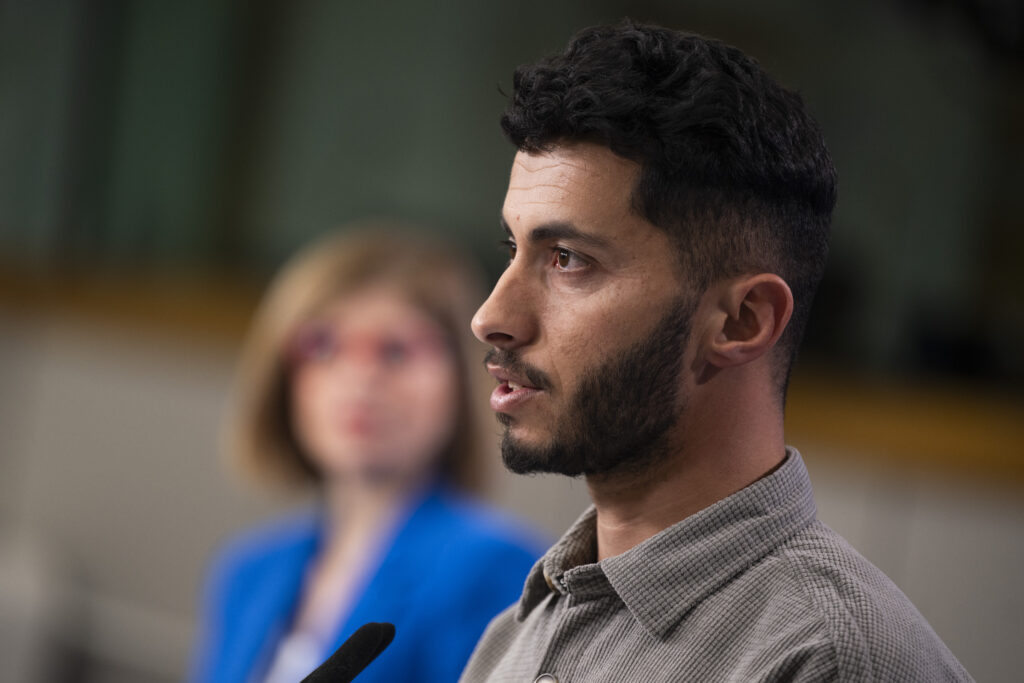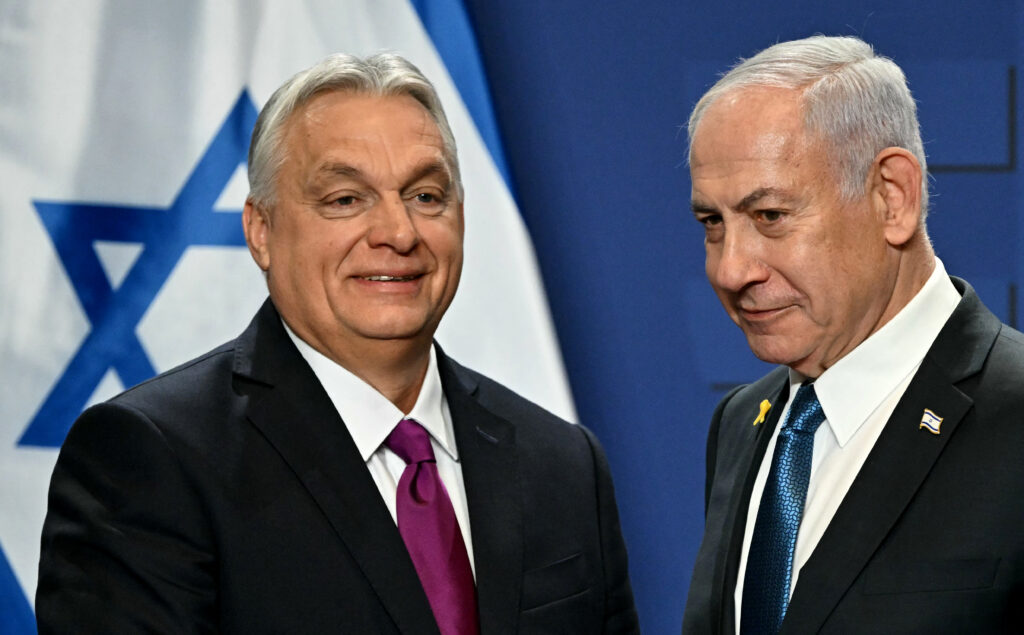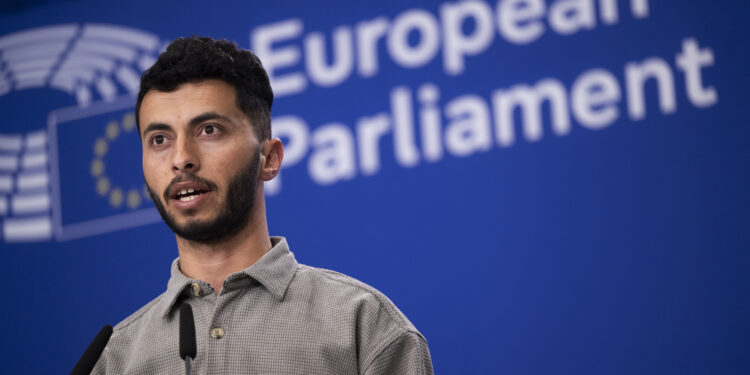Brussels – Denunciation of the atrocities of the Israeli occupation in Palestine and the violence of settlers finds space in the European Parliament. Palestinian filmmaker Basel Adra is in the EU capital to promote the release of No Other Land, the recently Oscar-winning documentary about the abuse suffered by the Palestinian community of Masafer Yatta.
During a press conference held today (April 7) at the EU Parliament in Brussels, Palestinian journalist and activist Basel Adra spoke about the work carried out for five years (between 2019 and 2023) with the other three co-directors—Hamdan Ballal, a Palestinian, and two Israelis: Yuval Abraham and Rachel Szor—to document “the brutal occupation of my community in Masafer Yatta,” and which will be screened at the very Parliament the day after tomorrow (April 9) in the presence of the author.
The film, Adra explains, portrays the demolitions of homes and schools, the destruction of water pipes, the violence against the inhabitants, and all the abuse that the indigenous Palestinian communities continually endure at the hands of Israeli settlers, backed directly by the IDF, Tel Aviv’s army. It also testifies to the uncontrolled (indeed government-incentivised) expansion of settlements, which is illegal under international law.
Filming the movie—that won best documentary at this year’s Oscars—ended in 2023, the director noted, “but now the situation on the ground is at least twice as bad as what you see on the screen.” Since last January, he said, “more than a hundred attacks have been conducted against our villages, and at least a score of houses have been demolished.”

Masafer Yatta is an inhabited centre consisting of some 20 small villages on the southern border of the West Bank, in the so-called C Area: one of the areas into which the Oslo Accords of the 1990s had divided the Palestinian enclave, where Israel holds both political-administrative control and a monopoly on security and which constitutes about 61 per cent of the West Bank.
The 28-year-old Palestinian then spoke about the attacks he and his colleagues were victims of. Adra was attacked in February by settlers in the West Bank, while on March 24, it was the co-director’s Hamdan Balla turn. “Masked settlers together with Israeli police raided his village,” he recounted, and “they beat him with rifle kicks and with their bare hands.” After the attack they picked him up and kept him for some 20 hours in custody, blindfolded and handcuffed him, and then brought him to a police station where he was charged “with attacking settlers who had invaded his village.”
The filmmaker recounted another raid last March 28, when about 20 settlers attacked Masafer Yatta and “kidnapped all 26 men present,” before a hundred soldiers returned in the night “breaking into a school built with European funds,” where they damaged the structure and furniture.

These are not isolated cases, Adra assures. Palestinians are routinely attacked throughout the West Bank as part of a “Jewish state policy to take our land and expand settlements to prevent the formation of a future Palestinian state.” “But since not all Palestinians have won Oscars, then they don’t get media attention,” he noted, referring to the uproar caused by the attack on his colleague Balla. Indeed, the Hollywood Academy itself took a while to publicly express its support for the co-director assaulted by settlers, triggering a further spiral of international controversy.
The problem, Adra points out, is that all the abuses, violations, war crimes, and crimes against humanity committed by the Israeli side are effectively covered by a blanket of impunity while “diplomatic relations remain solid, with the Europeans continuing to buy products from extremist settlers and the United States continuing to deliver weapons and funding.”
“This is not a game,” he warns, “there is a regime that is violating international law and publicly discussing ethnic cleansing.” International law is being violated all the time, but Israeli Prime Minister Benjamin Netanyahu “is free to circulate in Hungary and potentially in other European countries” despite the fact that an arrest warrant issued by the International Criminal Court (ICC) hangs over his head.
The 28-year-old director speaks of “double standards” between the treatment of war criminals in Ukraine and Palestine. In the war in the former Soviet republic, he says, “everything is said straight, no one is hiding, Russia is being boycotted and sanctions are being imposed, while there is always some excuse when it comes to Israel.” “The International Court of Justice has already recognised that the occupation is illegal,” Adra urges, but “it is the states that are part of the Court that must apply its rulings. To do so requires political will, which is not on the horizon.

What we hear from Europe, the director continues, “are just words,” but the annexation of the occupied territories is a process that “is already happening” and “must be stopped by applying international law.” At the very least, he adds, “European states, especially the largest ones like Germany, France, and Italy, should recognise the State of Palestine.” And then Brussels should “protect at least the humanitarian projects it funds,” making it clear to Tel Aviv that it “cannot destroy the facilities built by the EU; otherwise, there will be a backlash.”
After that, Adra reiterates that sanctions should be imposed against those responsible for the violations and trade with illegal settlements should be blocked. “These are the darkest days for the Palestinian cause,” the director confesses. “We feel helpless and call on the world to act,” especially Western countries, since “if anything can change, it will have to start from here or the United States.
In recent days, audiovisual evidence has emerged of the Tel Aviv military’s killing of 15 Red Crescent aid workers, which occurred in late March and for which the Jewish state had previously denied any responsibility, speaking of a legitimate action against “terrorists”. In the early hours of today alone, Israeli shelling on the Gaza Strip has killed more than 30 people.
In Khan Yunis, a tent housing media workers was hit by IDF bombs. Adra recalled Palestinian journalists working in Gaza, the only eyes through which the world can follow the ongoing tragedy. “Today, counting journalists still alive is easier than counting those killed,” he said, quoting a colleague. According to figures provided by the Committee to Protect Journalists (CPJ), since October 2023 to date over 170 journalists have been killed in the Strip, the highest number ever recorded in any armed conflict.
English version by the Translation Service of Withub






